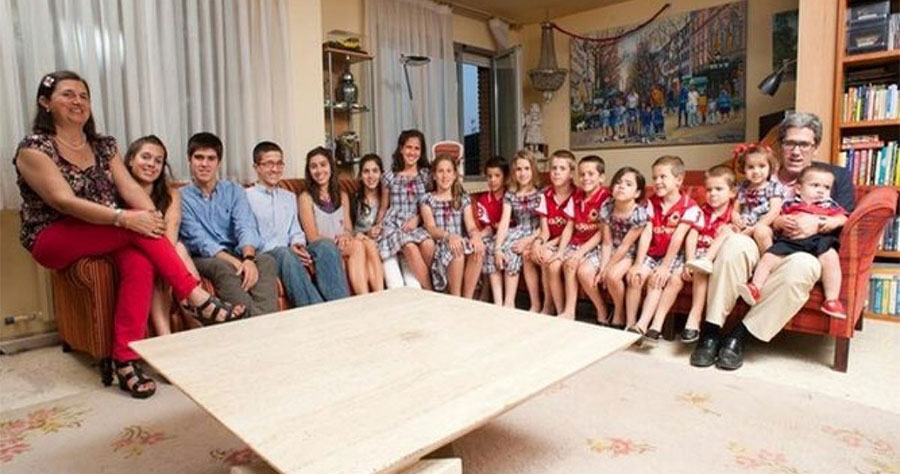In the end it was brief – all too brief. Between diagnosis and death a mere two week period. Jose Maria Chema Postigo, father of the largest family in Spain died aged 56 from liver cancer.
He and his wife had been scheduled to give a talk here in Dublin in January of this year to Family Enrichment Ireland on the joys and the practicality of raising a large family something Mr Postigo as father of eighteen children was more than qualified to speak on. Sadly, the talk was cancelled a week before it was to take place as Mr Postigo was admitted to hospital. He had lost up to 11kg in a month and post diagnosis the doctors had given him four months to live.
His wife, Rosa Pich, announced his death on Instagram with steadfast faith and fortitude. “God is our Father. He is very good although at times we do not understand. An hour ago Chema has gone to Heaven forever, forever, forever…. We don’t really know what God has prepared for those who are faithful. I want to thank you again for all your support, prayers and affection. If we have managed to bear this situation peacefully, it is because many people have been praying. We continue to count on your prayers. Thank you!”
Though never having had the privilege of meeting Chema in person, I have seen him on the short documentary that Spanish television did of this remarkable family [this can be seen by googling: Comando Actualidad TV1 (Febrero 2014)]. What stands out clearly, is what a remarkable husband and wife team they both made; she with characteristic good humour and energy; he with a quieter, though loving presence amidst this charmingly large family.
Raising a family always demands much love and patience: raising a family of eighteen, I should imagine, demands heroic quantities of both virtues. Fully convinced that marriage was a call to holiness, the Postigo family travelled the world giving talks and working for IFFD, a foundation which runs the Family Enrichment Programmes, a case study method which helps parents to become better parents. At his funeral, there were people from Poland, Belgium, Hong Kong, Denmark, China, Switzerland, Portugal and from all over Spain.
In the documentary we get a fascinating glimpse into the inner life of this family: there is hustle and bustle certainly and a constant chatter of children’s voices, but it is the happiness, responsibility and service of the other that are the most remarkable traits, whether this is helping prepare the meals, folding one’s clothes, making one’s bed or just a genial family dinner.
Tragedy was no stranger to this household: three of the Postigo children died from heart conditions. The eldest daughter died aged twenty-two in 2012 despite doctors initially saying she would not live past three years of age. The second and third child died at eighteen months and ten days old. These latter two died within the space of four months of one another.
Rosa attributed her and her husband’s ability to cope with the soul-wrenching agony of not one but two deaths within four months of one another to their unshakeable faith in God. In an interview with El Mundo in 2014 she claimed, “If we had not had this faith, I would have committed suicide, but thank God I have it”.
Given that their eldest was ill with a heart condition and these two recent deaths, doctors advised the parents against having any more children. Ignoring this advice, and trusting in the providential hand of God, they went on to have fifteen healthy children who are now between the ages of seven and twenty-five.
The family were awarded the European Large Family Award in 2015 for their work in the charity Menudos Corazones, an organisation which helps children who suffer with heart problems.
At the funeral one of the older children gave a moving account of his father. “Father, you were many things. But above all you were a kind man, loving unconditionally your family, a friend to your friends. A loving husband and father. Loyal to your friends without ever looking at their social class, only wanting to love them and draw that person closer to God”. It sounds a lot like the definition of a saint. Santo subito?
Ar dheis Dé go raibh a anam dílis.
About the Author: Andrew Larkin
Andrew Larkin is teacher, musician and music critic based in Dublin. He is also director of Family Enrichment Ireland.

